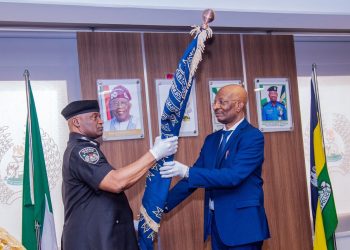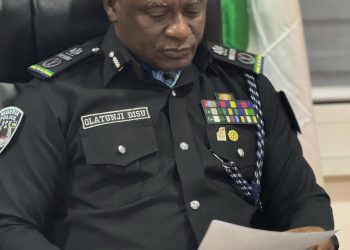By Nkechi Eze
The Nigeria Police has disputed Amnesty International’s report, dismissing claims of police brutality and violence against civilians during the #EndBadGovernance protests in Nigeria.
ACP Olumuyiwa Adejobi, Force Public Relations Officer, while briefing the press at the Force Headquarters on Sunday, stated that Amnesty International’s report contained baseless claims contradicting the actual events recorded during the protests.
Full Text Of The FPRO’s Speech:
Recall that Amnesty International, on the 28th of November 2024, released a report titled: “Bloody August: Nigeria Government’s Violent Crackdown on #EndBadGovernance Protests,” where several allegations were made against the Nigeria Police, including the killing of at least twenty four (24) persons in six northern states during the protests.
The claims made by Amnesty International in this report were at variance with the records available to the Nigeria Police.
All recorded incidents of violence during the protests were documented by the police in all 36 states of the Federation and the Federal Capital Territory (FCT).
These records are available at both the Department of Operations and the Department of Research and Planning of the Nigeria Police Force.
It is, therefore, surprising to see in Amnesty International’s report such unfounded claims that contradicted what was actually recorded during the protests.
Notwithstanding, the Inspector-General of Police, in response to the allegations contained in the report, directed a comprehensive and independent investigation into these claims.
To this end, a special investigation panel was immediately constituted and given a deadline to submit its findings.
The IGP also mandated Commissioners of Police in the states mentioned in the report to verify the allegations as they pertain to their states and to submit additional reports on the incidents.
Following these directives, the Commissioners of Police in the affected states conducted extensive inquiries in their localities and submitted their findings to the Inspector-General of Police. Copies of these findings were sent to the special investigation panel.
Furthermore, members of the panel visited the affected states and areas mentioned in the report, compiling their findings in a comprehensive document submitted to the Inspector-General of Police, Kayode Adeolu Egbetokun, PhD, NPM, FSSP, NEAPS.
This report forms the crux of today’s briefing, where I will present detailed investigation report addressing the wide-ranging allegations made against the police in Amnesty International’s report.
Verified Findings:
BORNO STATE:
In Borno State, it was established that the protesters were violent, engaging in widespread looting, pillaging, and wanton destruction of public and private property. For example, the Skill Acquisition Centre of the United Nations High Commission for Refugees (UNHCR) was looted and vandalized.
The warehouse of the World Food Programme, located on Baga/Maimalari Barracks Road, Maiduguri, was also looted, with several items belonging to the international organization destroyed and stolen by some of the protesters.
Of particular interest is the reported death of three fuel attendants at A.A Kime Filling Station—Nasiru Mustapha (26), Amodu Garba Maina (24), and Momodi Hassan.
Amnesty International claimed on pages 22 and 25 of its report that these three individuals died when a hand grenade was thrown into the filling station by a convoy of police vehicles.
These allegations are not only false and misleading but are also a clear attempt to incite the general public against the police and tarnish the image of the Nigeria Police Force in the eyes of the international community.
For the record, the Nigeria Police does not possess or utilize explosive hand grenades in its operations. Explosive hand grenades have never been purchased, issued, or utilized by the Nigeria Police Force since its establishment as a law enforcement agency.
How and where Amnesty International obtained such information can only be speculated upon by mischievous minds.
To set the record straight, the trio of Nasiru Mustapha, Amodu Garba Maina, and Momodu Hassan, all staff of Kime and Sons Filling Station, were killed by an Improvised Explosive Device (IED) fabricated with a safety-free mechanism and planted at the filling station on Baga Road, Maiduguri—not at Bolori Junction as Amnesty International claimed.
Furthermore, these three young men were not protesting when they met their untimely deaths.
In fact, they did not participate in the protests and were believed to have been killed for choosing to ignore the protests and continue with their lawful business.
It should also be noted that the Nigeria Police, based on credible intelligence, had warned ahead of the protests of terror elements planning to infiltrate the demonstrations.
The protest in Borno State on 1st August, 2024, witnessed three IED explosions planted by unknown persons at the following locations:
• Deribe Junction along Bulumkutu-Abuja Road, Maiduguri;
• Kime and Sons Filling Station along Baga Road, Maiduguri; and
• A residential area within Maiduguri metropolis.
The Police Bomb Disposal Unit responded to these explosions, recovered evidence of the improvised explosive devices, and facilitated the evacuation of casualties to the hospital.
For example, at Deribe Junction, the explosion left three adult males severely injured—Guri Mohammed (24), Isa Hussaini (20), and Ahmed Abdullahi Yusuf (24). At the third location, one Modu Jalo (35) was injured in a residential house in the “Maduganari” area.
Therefore, the claims by Amnesty International that the Police threw hand grenade from a convoy of vehicles into a Filling Station killing three persons is a blatant falsehood and leaves right thinking members of the society dismayed at this reported falsehood by an international agency which ought to act in accordance with international norms and standard of fair and honest reporting of human rights violations in the country.
NIGER STATE:
Amnesty International alleged that three persons—Yahaya Isa (32), Mohammed Bukau (38), and Musa Muhammadu—were shot and killed in Suleja, Niger State.
This claim has been found to be false. Reputable sources in Suleja and Tafa areas confirmed that nobody was killed by the police in Niger State on 1st August, 2024.
It is instructive to note that Amnesty International’s claim was based solely on an unverified and disputed report published in Premium Times on 18th August, 2024, titled “How Police Killed, Injured Protesters During End Bad Governance Protest in Niger State.”
For an international agency to publish a report based on unverified local tabloid information is unethical. If Amnesty International’s motives were genuine, it would have verified this information from local authorities before publication.
KATSINA STATE:
In Katsina State, Amnesty International alleged that one Shafiu Mukhtar of Filin Sanyi Kofar, Sauri, Katsina, aged 21, was shot dead by the police on 5th August, 2024.
This report has been fact-checked and found to be false. Reliable sources confirmed to the verification team that there was no report of any killing in the community on that day.
There are also no records in police stations or hospitals of such an incident.
KADUNA STATE:
Amnesty International’s report claimed that on 1st October, 2024, the police in Kaduna State killed one Abubakar Adamu Abdullahi, a 24-year-old tailor, by shooting him in the chest.
However, from verified records, there was no protest in Kaduna on that date, nor was there any killing recorded.
Instead, on 6th August, 2024, during the protests, a military patrol at Samaru, Zaria, accosted some youths vandalizing public property. In the process of firing a warning shot, one Ismail Mohammed was accidentally hit by a bullet and died on the way to the hospital.
The Nigerian Army immediately took responsibility for this incident, conducting an open investigation, arresting the soldier responsible, and visiting the family of the deceased. Amnesty International’s report on this incident is a misrepresentation.
JIGAWA STATE:
In Jigawa State, Amnesty International stated in its report that two female citizens were shot and killed by the Police at Hadejia and Dutse.
The report on pages 20 and 21 identified those killed as Halima Abdullahi ‘F’ aged 28yrs allegedly killed at Hadejia; Sadiya Sabiu ‘F’ aged 20yrs allegedly killed at Hadejia; while Rabiu Salihu ‘M’ (age unstated) was said to have been killed in Dutse.
This report has also been found to be inaccurate and totally misleading. There is no evidence of killing at Hadejia as confirmed by relevant authorities of the Hadejia Emirate Council.
The alleged death of Halima Abdullahi and Sadiya Sabiu has been found to be false, while Rabiu Salihu was not killed by the Police as alleged but died from injuries sustained when some protesters who attempted to gain forceful entry into the Government House Dutse, hurled stones and hard objects in his direction and fatally injured him on the head.
He was eventually rescued by the Police and rushed to the Dutse Teaching Hospital where he succumbed to his injury.
The assertion by Amnesty International that he was shot in the head by the Police is emphatically false and outrageous especially as the report stated that he died the next day.
One wonders how a victim of gunshot to the head would manage to survive for that long. It must be noted that even when the protesters in Jigawa became violent and riotous, the Police restrained itself and avoided the use of firearms against the protesters.
KANO STATE:
In Kano, Amnesty International alleged that the Police shot and killed twelve (12) persons from 1st – 3rd August 2024. While unconfirmed records suggested that twelve (12) persons comprising of eleven (11) males and one (1) female died from various degree of injuries, none was attributed to police action.
The unverified reports suggested that some of the protesters who died, were killed by the owners of the property they were looting and pillaging, and others were killed by assailants who took undue advantage of the crisis and riot across the city to perpetrate heinous crimes.
However, from verified records in Kano State Police Command, there were no documented evidence or records of loss of lives reported to the Police by relatives of the deceased.
It is important to note that some of the Protesters arrested in Kano had in their possession AK47 Rifles, which were recovered and properly documented by the Police in Kano.
A Protester found in possession of firearms was identified as Mahe Ahmed Mohammed. He was arrested with Rifle Nos.9130 and 1494 along with fifty-nine other suspects, who had invaded the premises of Kano State High Court at the Audu Bako Secretariat and stolen several government properties.
Other Allegations:
The Nigeria Police Force categorically denies the allegations of excessive use of force as claimed by Amnesty International as these claims are false, misleading, and an unfair misrepresentation of the actions and conduct of our officers.
The Nigeria Police Force operates under the highest professional standards and remains fully committed to upholding human rights and the rule of law.
Our officers deployed for protest management are regularly being trained in compliance with international human rights standards.
While the NPF respects and recognizes the constitutional right of citizens to peaceful assembly and freedom of expression, it is equally charged with the responsibility of maintaining law and order.
During the #EndBadGovernance protests, police officers were deployed to safeguard protesters, protect lives and property, and prevent disruptions caused by infiltrators seeking to hijack the demonstrations.
Contrary to Amnesty International’s claims, there is no credible evidence to support allegations of killings or excessive use of force by the police.
Reports of officers firing live rounds at protesters or targeting unarmed civilians are baseless and were not corroborated by independent investigations.
Evidence available to the NPF indicates that certain elements infiltrated the protests with the intention of inciting violence, destroying public property, and endangering public safety.
The police responded with minimum force without the use of fire arms to disperse such disruptive elements in accordance with legal guidelines.
Detentions and prosecutions were conducted within legal frameworks, and allegations of arbitrary arrests, maltreatment, or denial of legal access are unsubstantiated.
The report released by Amnesty International on the End Bad Governance Protest in Nigeria, is inaccurate and misleading.
All international organizations that are independent of political and economic interest are required by ethical and international best practices to demonstrate objectivity, fairness and balance in their reportage. Unfortunately, these qualities were missing in the Amnesty International report.
The Nigeria Police Force in this present dispensation under the leadership of IGP Kayode Adeolu Egbetokun has demonstrated high level of professionalism in Public Order Management across the Country.
Our Standard operating procedure with respect to peaceful public protest, is to provide security for peaceful protesters to conduct their protest unmolested by opposing group, miscreants and criminal elements.
Most importantly, our commitment is to ensure that peaceful protests do not turn violent or endanger the lives and properties of other law-abiding citizens.
Where Protesters begin to loot, burn, pillage property and kill innocent citizens including Law Enforcement Agents, the Police are duty bound to halt the drift into anarchy using minimum force.
Finally, the Police will wish to draw the attention of Amnesty International to the recent decision of the United Nations General Assembly at the Fifth Session of the Human Right Council held between 13th June – 8th July, 2022, published in its report reference A/HRC/50/42. Page 18 Paragraph 81 (b).
The UN Human Rights Council stated thus: In regard to facilitating peaceful protest, States Should: “Issue Protocols on the Facilitation of Peaceful Protest for Law Enforcement compatible with International Standard regarding the use of force, laying out measures to protect peaceful protesters, bystanders monitors, lawyers and medics, including from Counter-Protesters and other targeted forms of violence, during a variety of crisis situations and providing for graduated use of force, setting clear limitations on the use of lethal and less-lethal weapons. Such protocols must take into account a gender perspective and address the vulnerability of different groups”.
This decision by the United Nations Human Rights Council, has been the gold standard for the Nigeria Police Force and our established protocols which we have followed diligently is to provide adequately for the security and safety of protesters by ensuring that criminal elements and hoodlums do not take undue advantage to cause total breakdown of law and order.
The use of force on Protesters is prohibited under the protocols except when necessary to protect lives and prevent the destruction of property.
This was the protocol adopted during the “End Bad Governance Protest” as, Police Commands across the nation were specifically directed to protect lives and properties of citizens during the protest.
Amnesty International is advised to have retrospection on its frequently false reporting on Nigerian’s Law Enforcement activities and reflect on its reporting methodology, by ensuring that its reports are accurate and contains true and fair expression of events that touches on National Security and safety of all Nigerians.
Accurate reporting of facts is key to the integrity and character of every International Organisation and Amnesty International should not be an exception.
Conclusion:
The Nigeria Police Force will in due time be writing the Amnesty International to demand for a retraction of this report from the public space and with a public apology.
The Nigeria Police Force remains resolute in protecting the rights of all citizens while ensuring the security and stability of the nation.
We therefore urge the public to be wary of sensational reports designed to incite mistrust and weaken confidence in law enforcement institutions.
















